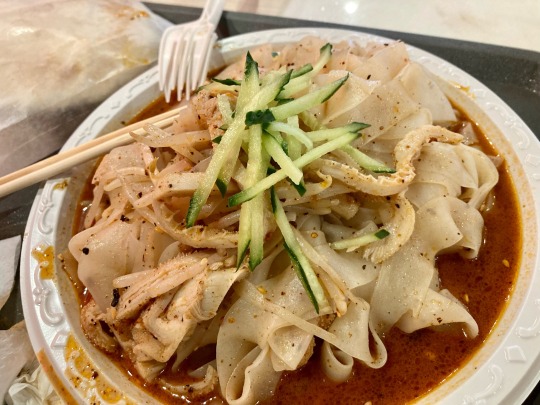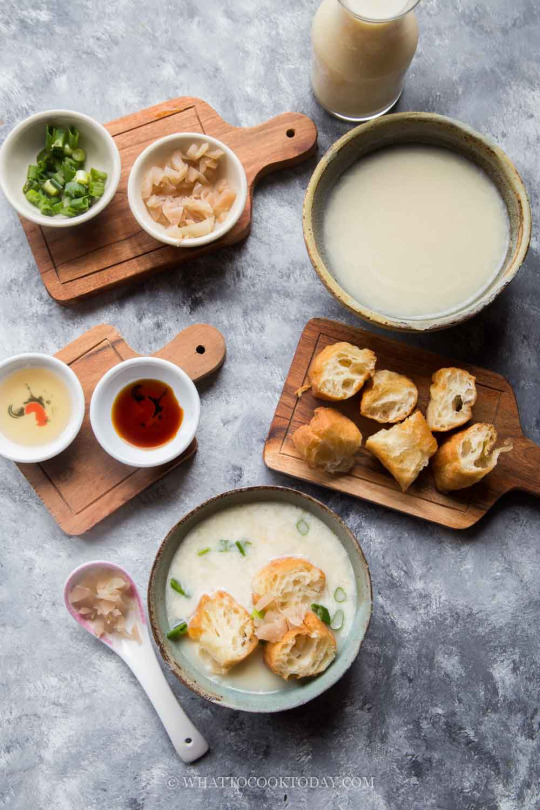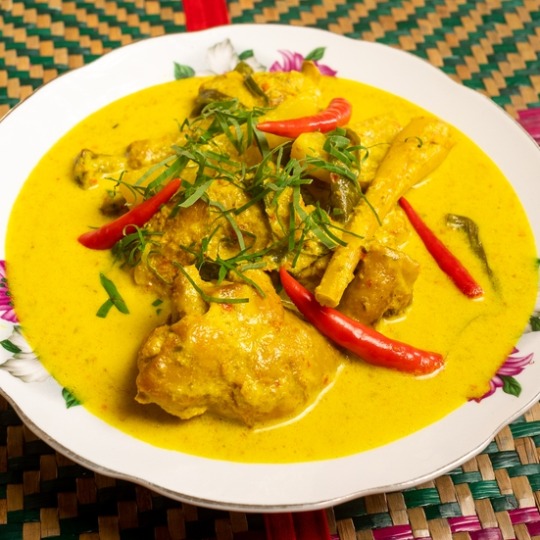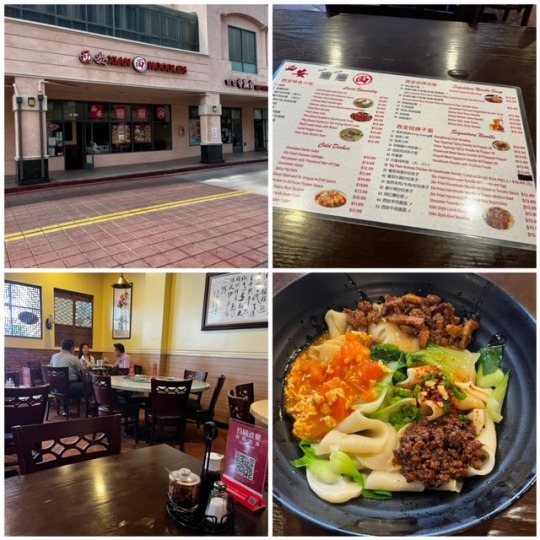#Xian Cuisines
Text

6 notes
·
View notes
Text

Taiwanese Savory Soy Milk Soup / Xian Dou Jiang (Vegan)
#vegan#breakfast#Taiwanese cuisine#East Asian cuisine#soups#xian dou jiang#soy milk#plant milk#green onion#zha cai#pickles#vinegar#soy sauce#youtiao#🤍
23 notes
·
View notes
Note
Tell me one of your favorite and least local dish!
Omg nobody asked me this before but djfjslaksla okay so like there's this one dish that i really really like its Chicken Coconut Curry with Green Chilli (or in my native language its called Masak Lemak Cili Api) and oh god Im so obsessed with this dish, if I ever go to a local restaurant for lunch I will order this with sides of white rice and spiced fried chicken. Idk how to explain the flavor but it doesnt taste like a curry really, its more like a creamy tumeric with a heavy hit of chilli (which is why it's yellow). I am a picky eater but I would literally add more rice if my mom ever cooks this at home.

Seasia cuisine is very flavorful and unique and I cant deny it but sometimes I just don't like some of it.

Everyone like Sambal Belacan (it's a sambal made of shrimp paste usually mixed with chillies, onions and lime juice) I dont really consider this as a main course dish but more like a side dish where you eat with raw veges and herbs or as an accompanying dish to white rice. I don't want to yuck someone's yum but for me it just smells too strong to me like if you ever smell shrimp paste you understand how overpowering the smell is. It's also usually made raw and not cooked on a stove and personally Im a bit picky when its related to raw food.
#also omg you gotta tell me more about filipino cuisine cuz like while indonesia malaysia singapore brunei and parts of thailand have-#dishes that we all share like for example rendang and curry#i dont think other seasians knows much about dishes from phillipines like if you ask me the only Filipino food i know-#is adobo lumpia and jollibee (we just had it recently here in my country btw its so good omg we missed out)#so like i really would love to know more about food asjxhekajslq im pretty much a foodie I've eaten a lot of cuisines from asia-#including the regional specialties when I was living abroad#im going off tangent here but oh god xinjiang and xian cuisines in china is amazing and i am crying at the thought that i will never ever-#will eat it again and i can never replicate the dishes here ;w;#okay skdjeksiql im hungry i think im going to cook some noodles after this ask xkdiemdsjdjwks#ask#dwdoesarts
13 notes
·
View notes
Text
XiAn Biang Biang Noodles, 1039 E Valley Blvd, San Gabriel, CA 91776

Once you’re this deep in the San Gabriel Valley, almost every business is Chinese and most of the people in the area are Chinese. That’s also where you’ll find authentic regional Chinese cuisine, like the new XiAn Noodles. It’s more than a noodle shop. The menu includes local specialties (e.g., pita bread soaked in soup, Chinese hamburgers, lamb haggis soup), cold dishes, noodle soups, Biang Biang noodles, stir-fried noodles, stir-fried dishes, soups, boiled dishes, vegetarian dishes, fried rice, dumplings, and drinks.
Three toppings spicy noodle with pepper oil ($13.99): Even though it’s called spicy noodle, there is no chili pepper next to it on the menu. Oversight? I told the server that I liked spicy food and she recommended the three toppings spicy noodle dish. The three toppings are (1) scrambled eggs and tomatoes, (2) minced braised pork belly, (3) a dark ground meat sauce. I also spotted bok choy, bean sprouts, and chili pepper. The noodles are served dry but in a pool of pepper oil. The handmade noodles were extra wide, long, thick, and very chewy. It didn’t seem spicy to me but I added the house hot sauce. The pepper oil wasn’t too salty…not sure what was it in but it seemed a little tangy (vinegar) and slightly sweet. I’m sure it had soy sauce and some spices. Very tasty. The minced pork varied from almost all fat to very dry and a bit salty – but the other elements weren’t salty so it balanced out. The portion was just right.
The interior looks older (but remodeled) and it’s inside an older mini mall with parking. The kitchen is in the back, so I didn’t see or hear anyone making the noodles. Service was friendly. They take your order using an iPad. You can also scan the QR code and order online. Online ordering is available but some of the menu items are listed in Chinese only.
4 out of 5 stars.
By Lolia S.
#XiAn Noodles#XiAn Biang Biang Noodles#Chinese restaurant#Chinese noodles#biang biang noodles#handmade noodles#noodle soup#San Gabriel#XiAn restaurant
3 notes
·
View notes
Link
Xian Private Tour: Terracotta Warriors with Qin Culture-Themed Cuisine #Tours2Go #ToursToGo
0 notes
Photo

Chinese cuisine is incredibly varied, with each style having its own character, special ingredients, cooking methods and tastes to suit the climate and culture of their local community. Book your stay at Grand Park Xian, if you wish to experience the signature appeal of Park Palace with authentic Cantonese delicacies to inspire your senses with rich local flavors, textures & tastes.
0 notes
Photo









Cdrama: Royal Feast (2022)
Gifs of Intro of cdrama “Royal Feast”
ENG SUB 《尚食 Royal Feast》 EP01: 皇太孙南巡归迟错过夜宴,姚子衿巧献佳肴惊艳陛下 | 许凯、吴谨言、王一哲 | 古装宫廷美食剧 | 欢娱影视
Watch this video on Youtube: https://www.youtube.com/watch?v=CmRwZx1MrDU
#Royal Feast#尚食#Shang Shi#Imperial Cuisine#2022#cdrama#Chinese drama#episode 1#youtube#English subtitles#Hunan TV#Mango TV#Xu Kai#Kevin Xu#Wu Jin Yan#Wang Yi Zhe#He Rui Xian#Zhang Nan#Wang Chu Ran
35 notes
·
View notes
Photo

Business dinner tonight consisted of Uyghur food. Also got some Shaanxi ghost pepper sauce as a gift for being such a good teacher this semester. Pour that stuff on your Xinjiang skewers and HOOOO BOY. Good thing I have some Uyghur yogurt drink to go with it.
Alhammdulillah, Xi’an has the best halal Chinese cuisine(s) outside of Xinjiang, Ningxia, or Gansu.
3 notes
·
View notes
Photo








沙县小吃 shaxian xiaochi /Sha-Xian Delicacies (Fujian cuisine)
669 notes
·
View notes
Text
GG Haikou Snacks Vlog

Urban Food Record Chapter 6, Taste Hainan cuisine Xian Zongdang Island Galaxy, wave by wave.
Open a beautiful “food” room with Xiao Zhan, and wish you a healthy Dragon Boat Festival~
25 notes
·
View notes
Note
fic previews? any verse! <3
Lotus Pier Restaurant and Bakery - baked goods, Hubei & Hunan cuisine
Phone: 0yyy-xxxx-xxxx
Business hours: 6 AM - 8 PM
Jin Zixuan
⭐⭐⭐⭐⭐ 18/08/12
Delicious food, friendly staff. The head chef sent me home with extra sweet potatoes, even though I came right before closing hours-will definitely be eating here again.
Jiang Yanli
Business Owner
19/09/13
You’re welcome anytime, A-Xuan.
Nie Huaisang
20/08/12
^Second the review. Unfortunately, I am not married to the head chef, so I got only leftovers when I showed up at closing time. u.u
Chang Yue
⭐⭐⭐⭐⭐ 28/08/12
Best braised sea cucumber I’ve had away from home! Congratulations on the restaurant, A-Li. Your parents would be so proud of you.
Jiang Yanli
Business Owner
31/08/12
Thank you, Auntie!
Wen Qionglin
⭐⭐⭐⭐⭐ 09/10/12
You have to try the daily baozi every time you come here! Xian-ge makes them fresh every morning, and they come with a little cup of free soup if you know to ask for it! <^-^>
Jiang Wanyin
Business Owner
11/10/12
No they don’t? @Wei Wuxian????
Jiang Wanyin
Business Owner
11/10/12
I asked my brother, apparently it’s just for you. -_-
Wen Qionglin
11/10/12
@Wei Wuxian Xian-ge!!! 🥺 🥺 🥺
Wei Wuxian
Business Owner
11/11/12
Anything for you, A-Ning. <3
Nie Zonghui
⭐⭐⭐⭐ 06/12/12
Excellent food, but most of the lunch dishes are too heavily spiced for my tastes, even though I ordered them all mild. Coffee and pastries were delicious, though--found a wonderful new breakfast cafe!
Wei Wuxian
Business Owner
06/12/12
Wait...is THAT what happened to Jiang Cheng’s packed lunch??
ZONGHUI GE I AM SO SORRY
96 notes
·
View notes
Text

4 notes
·
View notes
Photo

W branch of Xi’an of Shanghai Yen by IN•X Design Read more: Link in bio! Photography: Zheng Yan IN•X Design: Exclusive: W branch of Xi’an of Shanghai Yen. Strategic Dining franchise We discover the consistency between the brand and urban culture, and interpret it through space, thus creating unique local sensation for Shanghai Yen, creating active new market. In the 20th century, after decades of development, Shanghai cuisines have evolved from rustic dishes to exalted culinary products. Various famous chefs have appeared along with them. Meanwhile, Xi’an has gone through swift changes, and could no longer be simply described as ancient city… #china #xian #restaurant #архитектура www.amazingarchitecture.com ✔ A collection of the best contemporary architecture to inspire you. #design #architecture #amazingarchitecture #architect #arquitectura #luxury #realestate #life #cute #architettura #interiordesign #photooftheday #love #travel #construction #furniture #instagood #fashion #beautiful #archilovers #home #house #amazing #picoftheday #architecturephotography #معماری (at Xian, China) https://www.instagram.com/p/CiRTggPsp1I/?igshid=NGJjMDIxMWI=
#china#xian#restaurant#архитектура#design#architecture#amazingarchitecture#architect#arquitectura#luxury#realestate#life#cute#architettura#interiordesign#photooftheday#love#travel#construction#furniture#instagood#fashion#beautiful#archilovers#home#house#amazing#picoftheday#architecturephotography#معماری
6 notes
·
View notes
Text
so we know that xie lian's cooking wasn't always as horrendous as it is in present time. it used to be decent! however after his mum (whose dishes were Terrible) died, his cooking started to deteriorate to the point it's at now. so, consider: xie lian's cooking getting better.
xie lian cooking with and for hua cheng. hua cheng embracing him from behind and laying his head on xie lian's shoulder as he gives honest advice; saying what's well done, but also what could be improved. always a suggestion, sometimes several xie lian can choose from if he wishes.
accompanying him every step of the way, but also leaving xie lian space to experiment the way he likes to do. always, whatever xie lian does and throws into the pot next, is xie lian's own decision.
and xie lian, progressively, slowly, letting go of his bad cooking habits, being more careful with all his random experimenting. letting hua cheng guide him when they cook together, and remembering his advice when cooking for him.
xie lian even starts to try his hand at baking. it's a disaster at first. too sugary, too plain, overcooked, undercooked. but, like everything, it gets better.
eventually, it may not be perfect, or the great cuisine hua cheng makes, but it tastes good. after being convinced to taste xie lian's new dishes (it took, uhm, a while), feng xin and mu qing come more often to the little cottage on taicang mountain to share meals.
hua cheng temporarily tolerates them over these meals, for xie lian's sake. if they have something to complain about he shoots daggers at them from behind xie lian's back before they can say anything. but, most of the time, it's peaceful. just the usual bickering.
xie lian smiles all the while, happy, and that's all hua cheng could ever want. sometimes he leaves after a kiss and a threatening look to let the three of them reconnect over old xian le recipes. in the evening, he gladly listens whenever xie lian chooses to tell him all about it.
with time, xie lian heals. allows himself to heal. however, in memory of his mum, he never stops giving his dishes silly names.
| twitter |
#xie lian#tgcf#hualian#hua cheng#thought I'd share this over here too!#I mention this headcanon briefly in a fic of mine: to have and to hold#anyway#it's xie lian emo hours#bee writes#headcanons
149 notes
·
View notes
Text
The Long and Winding Road: Remembering My Two Maternal Uncles

My first uncle is to the left of my second uncle surrounded by the aunts. (Courtesy of Raymond Lee).
The passing of my two uncles has led to my reflecting on their lives, and the indelible impressions both left on me. My first (older) uncle, Cui Wen-Chiao (1925-2017), and second uncle, Cui Wen-Tse (1931-2021), led very different existences, but both experienced much of China’s upheavals from the past century.
After graduation from boarding school, my first uncle left home to seek his fortunes in the 1940s. In contrast, my second uncle kept close to the family and helped to look after the younger siblings during the Second Sino-Japanese War (1937-45) while his father and brother were away. In his late teens, however, he was separated from the family after the occupation of Nanjing and Shanghai by the PLA in 1949-50. By this time, my first uncle had married his classmate and stayed behind in Shanghai.
The career of my first uncle in the Chinese Merchant Marine spanned 50 years, where he toured the East and South China Seas, making ports of call to Japan and Hong Kong. He would captain his own vessel and serve as instructor at the Merchant Marine College of Shanghai Maritime University. Meanwhile, my second uncle studied history in college at Chengdu in Sichuan province, where he met his future wife. In the coming years, they and their families endured the travails of the Great Leap Forward (1958-62) and the ensuing famine (1959-61), during which my second uncle nearly perished from starvation. They all felt the effects of the political and economic turbulence that was the Cultural Revolution (1966-76), as their children (my first cousins) were compelled to forego college/university education.
Upon meeting my first uncle and his family in 1979, I was struck by his towering presence ( 6’ 2”) that belied a soft-spoken, dignified demeanor. He and his family enjoyed a quiet, simple life in the Latin Quarters near the Bund. Their apartment was furnished with rosewood antiquities, the only remnants of the material wealth from his wife’s family to have survived the Cultural Revolution. We met again in 1995 during the reunion among the six siblings.
Upon meeting my second uncle and his family at Xian in 1995. I was struck by his quick wit, easy banter, and sense of humour. He recalled as a youth fleeing with the family from one place to another to escape the ravages of war-torn China, and how American GIs introduced the neighbourhood kids and him to the game of baseball and gave them bubble gums and chocolates. My fondest memory was when he took me to visit the Cui family ancestral home at the industrial city of Shenyang in Northeastern China during August of 1995. He remembered vividly his grandfather working at a munitions factory near the city’s main railroad station during the 1930s. From him, I learned that the Cui ancestors were salt merchants originally from Shandong province, who migrated north to Liaoning province eight generations (200 years) ago. My other fond memory was visiting Chongqing with him in 2001, where we experienced the Sichuan customs and savoured it’s hot and peppery cuisine.
I was amazed how much my first uncle resembled my grandfather, who served as an UN advisor and university lecturer in agricultural economics. Born in 1908, he was only 17 when my grandmother, born in 1901, had first uncle. Years later, I learned that the traditional betrothal arrangement in northeastern China was where the bride would be much older than the groom. In contrast, I was impressed how much my second uncle resembled my grandmother, a Manchurian belonging to the Jin clan represented by the Plain Yellow Banner. She courageously and capably managed all domestic affairs during wartime and ran a tailor shop after they moved to Hong Kong. The one regret that she and her sons shared was not being able to reunite again after their separation.

The silk embroidery of the Shanghai Bund. (Courtesy of Raymond Lee).
Bund of the 1930s, as a memento of a long maritime career in the “Paris of the East.” Alas, I can only bid you both adieu from afar, dear uncles! May the warm, swift trade winds of the China Seas be at your backs in your voyage to the next world to reunite with my grandparents and first aunt.
Written by CHSA community member, Raymond Lee. Lee was born, raised, and educated in San Francisco Chinatown. Raymond and his wife reside in Winnipeg, Canada. He is currently employed at the Asper School of Business, University of Manitoba.
#CHSA#community#communityconnections#familystories#grandparents#aunts#uncles#chineseamerican#asianamerican#SecondSinoJapaneseWar#ChineseMerchantMarine#cultural revolution#chengdu#sichuan
11 notes
·
View notes
Text
Fic: and sings the tune without the words, ch. 1
Relationship: Jiāng Yànlí & Jīn Zǐxuān
Characters: Jiang Yanli, Jin Zixuan
Additional Tags: Epistolary, Food, Music
Summary: An epistolary follow-up to "the thing with feathers." Exchanged letters.
Notes: See end.
Previous fic in the series: “the thing with feathers”
AO3 link
----------------
To Jin-gongzi,
I am very glad you came to Lotus Cove, and that your visit coincided with the delivery of my spiritual instrument. It was very nice to talk with you about cultivation.
My core is slowly growing stronger. I don’t know if I told you, but I became very ill when I was quite little, and it weakened my body considerably. A-Niang didn’t think I would be able to be a cultivator as a result, and I didn’t either.
Until recently I thought cultivation was all fighting monsters, which looking back was a little silly of me! So I thought since I am too weak in my body to fight monsters, I couldn’t be a cultivator. When A-Xian was so ill, I wanted him to get better so quickly I asked our healer questions, and so A-Niang mentioned that maybe I could train to do healing cultivation.
Then Lan-xiansheng mentioned that if I cultivated musically it could also help me strengthen my golden core. He’s been giving me advice on meditative techniques and ways I can incorporate core-building into everyday activities.
One thing he told me is that I can use the time I spend cooking, which was nice to know. I find cooking to be relaxing, and I am happy to help nourish others through my food. Since I know my recipes, I can spend the time focusing on my qi as I prepare food, even chopping vegetables. It’s not easy—I actually burned a dish recently because my attention strayed too much, but it’s teaching me so much. I hope you will be able to try my cooking someday soon.
A-Cheng thinks I should try archery, but the bows are quite heavy for me. A-Xian thinks that maybe something more suited to my body could be constructed, but that will be a future consideration.
I am nearly done mastering the song I played while you were here, and am considering what to learn next. I hope it is not too forward of me to ask, what is your favorite song? Perhaps I can learn it and play it for you when next you visit, or when I visit Koi Tower. If you have a favorite food, please let me know as well. That way when you come to Lotus Cove I can make sure it’s cooked.
I hope this letter finds you well,
Jiang Yanli
To Jiang-guniang,
Thank you for your letter. It was a pleasant visit. I was fond of the rose candy served with the tea.
The instrument looks well-made and the decorative elements seem to fit you well. It’s quite elegant. In Lanling most instruments are trimmed in gold, but the mother of pearl was well-suited for you and shimmers in the light.
It is good you are working to improve your cultivation. I didn’t know of your previous illness, only that you were considered a weak cultivator—but I also didn’t know there was more aside from killing monsters one could do as a cultivator. If someone suffers injury or illness, they don’t have to stop cultivating. Maybe that should be better known.
I have heard you cook good soup. Yu-furen mentioned that Jiang Wuxian remembered it despite his amnesia. It must be quite good to be so memorable. Perhaps I can taste it sometime.
Archery is difficult without arm strength, but if you focus on your qi like you do when you cook, but in your arms, maybe it will help. I have heard the Lans do handstands, which is why they have such arm strength. Perhaps you could try that to see if you can develop your arm muscles?
One of my favorite songs is “Yangguan Sandie,” but I don’t know if it is easily played on a konghou. Please don’t trouble yourself on my account.
Two of my favorite foods are shuijing zhouzi (stewed pork hock) and dezhou pa ya (dezhou grilled duck). For sweets, my favorite is basi pingguo (toffee apple fritters). They are much different than the foods of Yunmeng, so they may not suit your palate. I’ve noticed Yunmeng cuisine is often very spicy, whereas in Lanling we prefer savory and salt. I do not cook, so I am not certain about recipes. I can ask a-niang and maybe she will send them.
If you have favorite foods you would like to enjoy next time you visit Lanling, please let me know.
Your family is much changed from the last time I visited, and I was surprised to meet your meimei. Did your brother’s illness change so much? A-Niang was concerned when we arrived, but she seemed glad to see your mother was very happy.
With best regards,
Jin Zixuan
------------
Estimated maps of MDZS/The Untamed generally place Lanling as in Shandong in the Linyi City area, so the foods mentioned are popular dishes from that area.
“Yangguan Sandie” has a konghou version that I found from a 2002 album by Cui Junzhi, but it was originally (unsurprisingly) written for the guqin. I also found a konghou version on Youtube. Estimates on the song’s age go back to the Tang Dynasty, though the earliest surviving music score dates back to the Ming Dynasty. The song was developed from the poem “Seeing Yuan’er off on a Mission to Anxi,” by Wang Wei, and is considered a classic farewell song.
Note that the konghou as it exists for this series is largely extinct (since the Ming Dynasty), replaced in the 20th century by a double-bridge harp of a more Western shape. It was a very courtly instrument.
#the untamed#untamed fanfiction#mo dao zu shi#chen qing ling#cql#mdzs#jin zixuan#jiang yanli#untamed fanfic#untamed fic#cql fanfic#cql fanfiction#cql fic#mdzs fanfic#mdzs fanfiction#mdzs fic#my fanfiction
7 notes
·
View notes